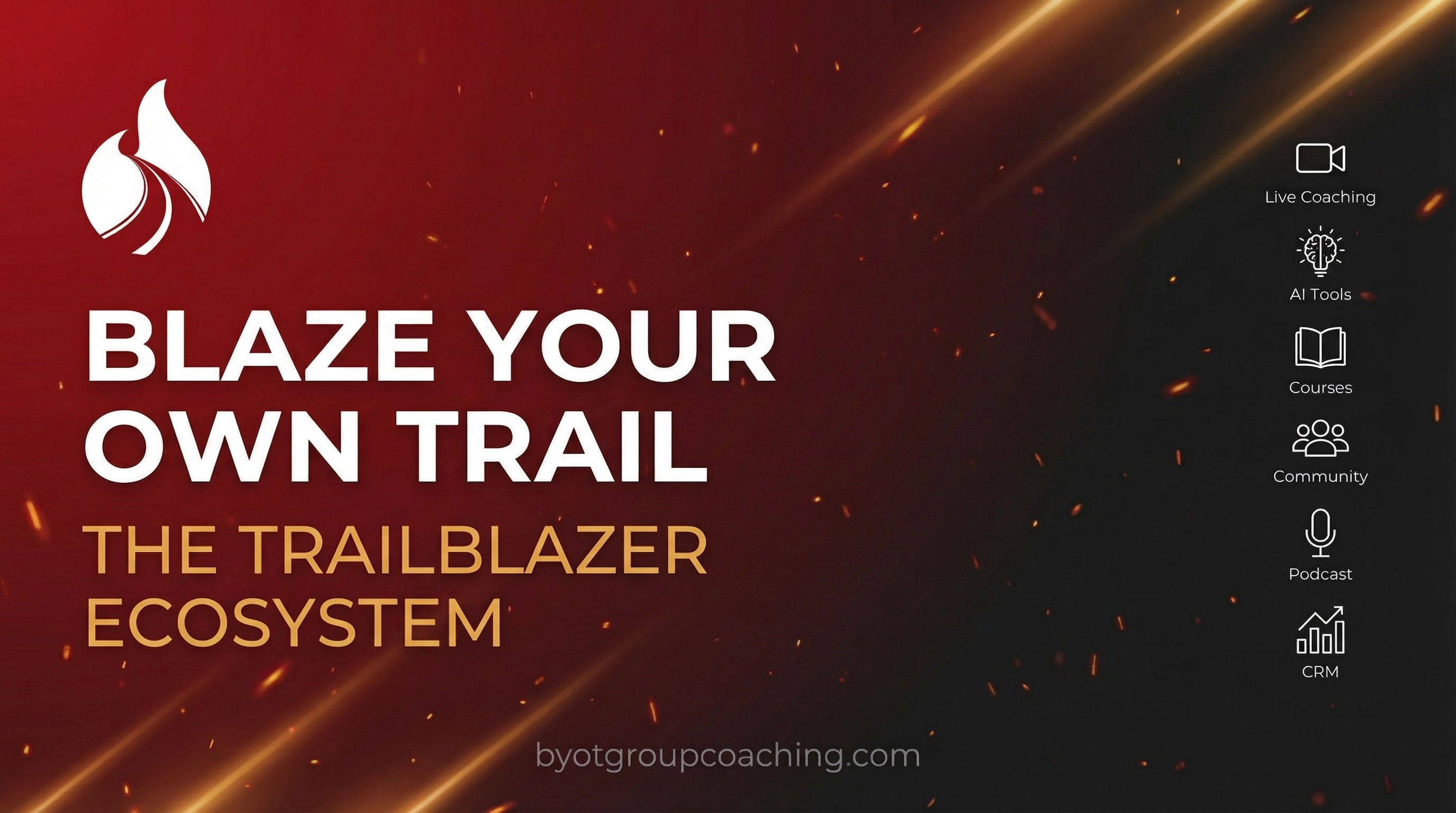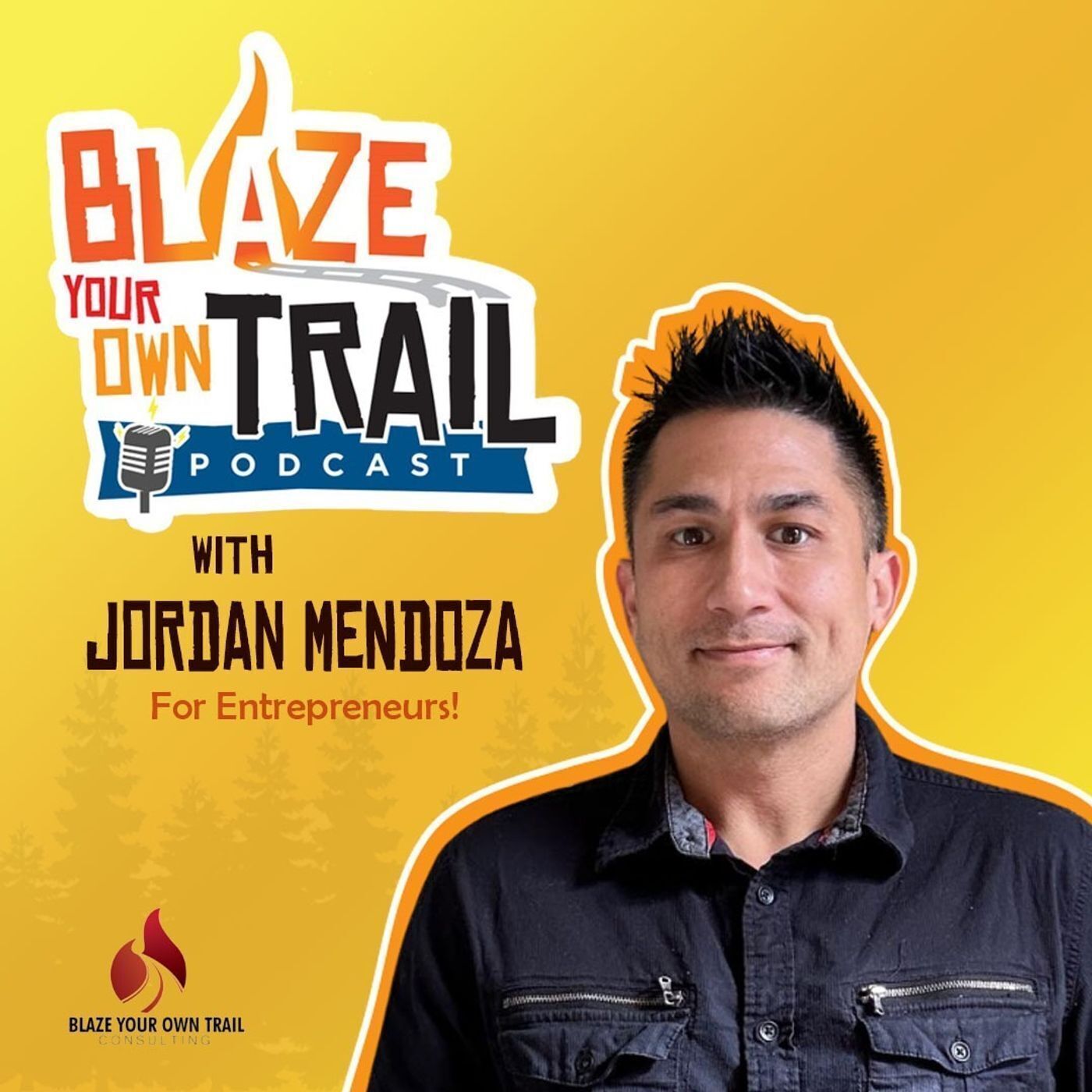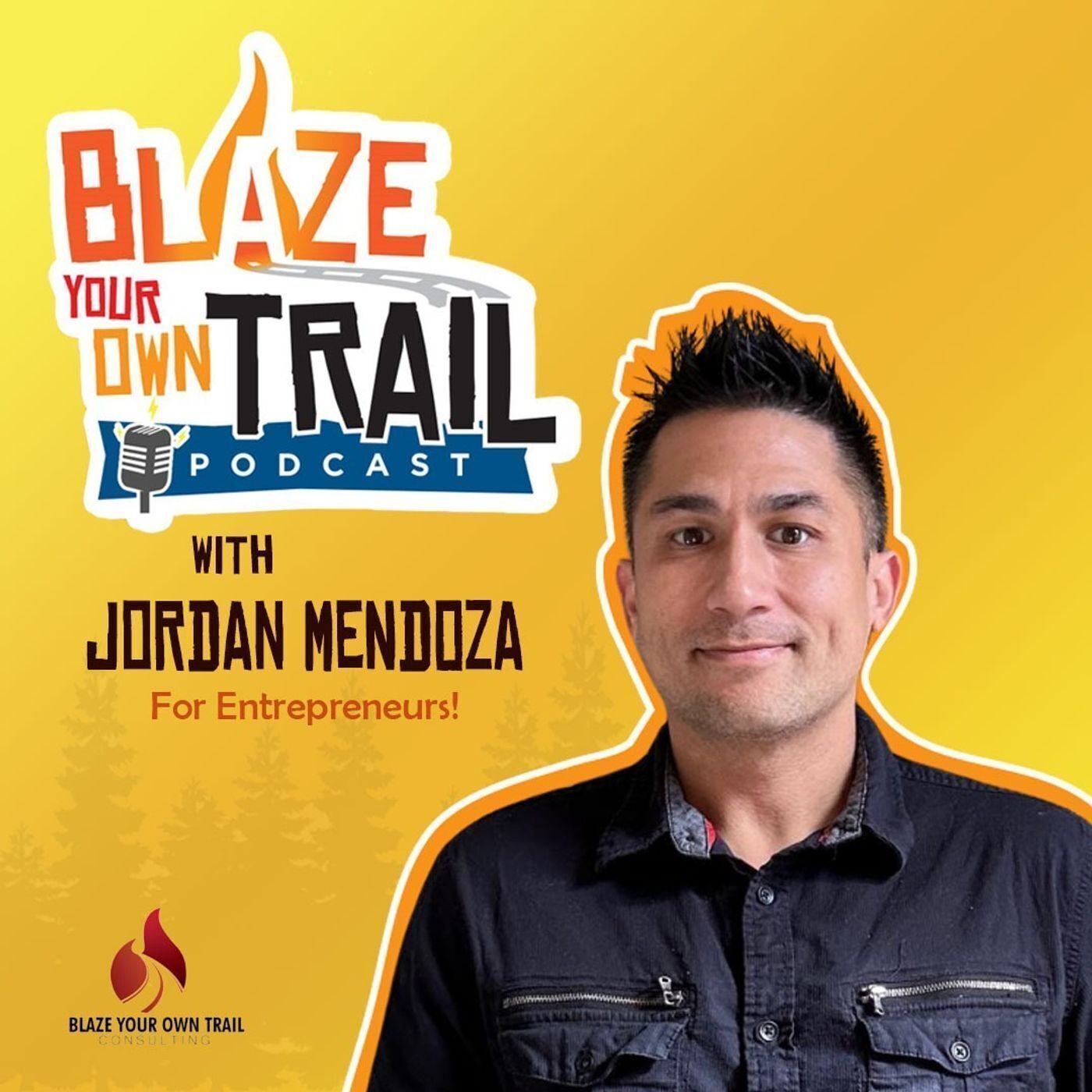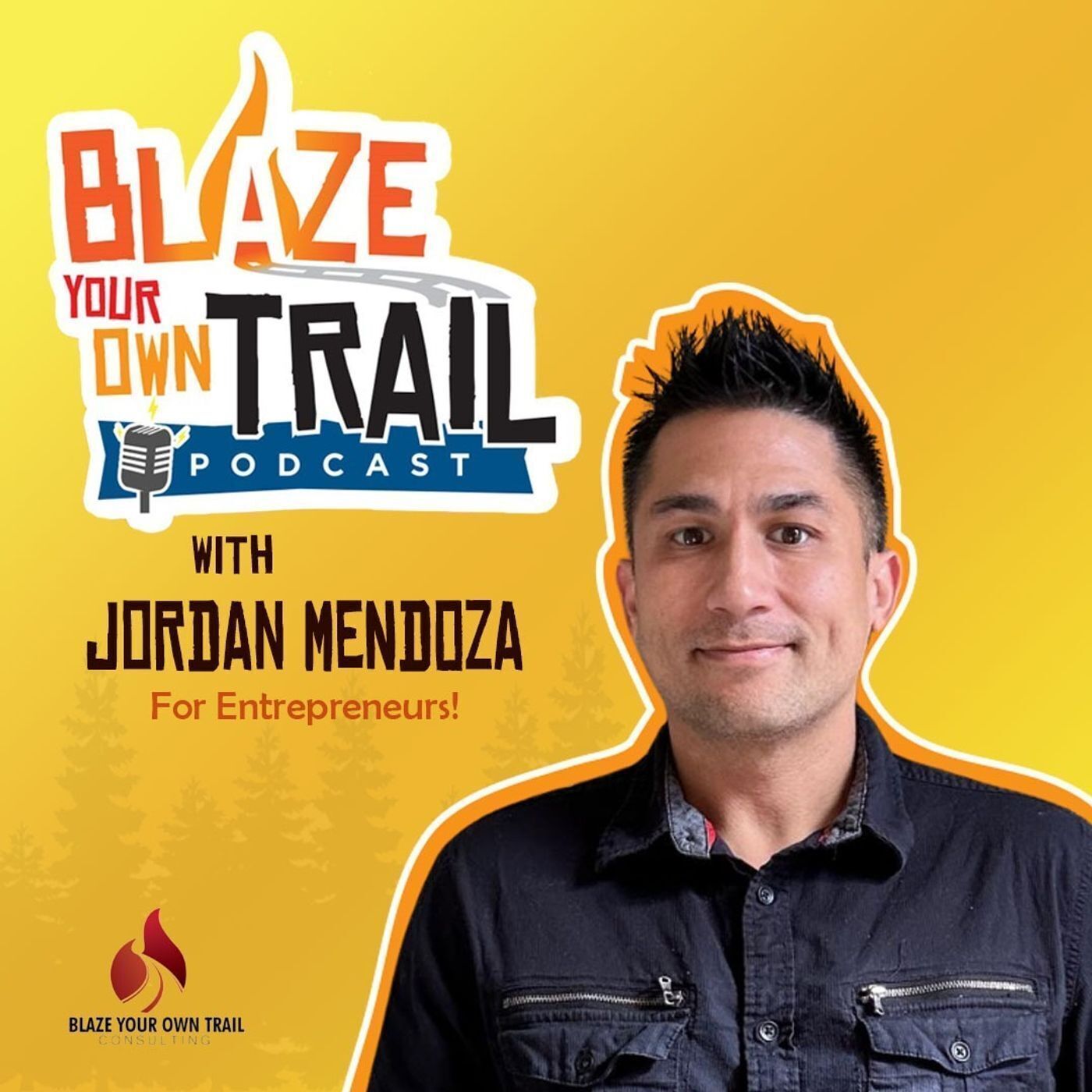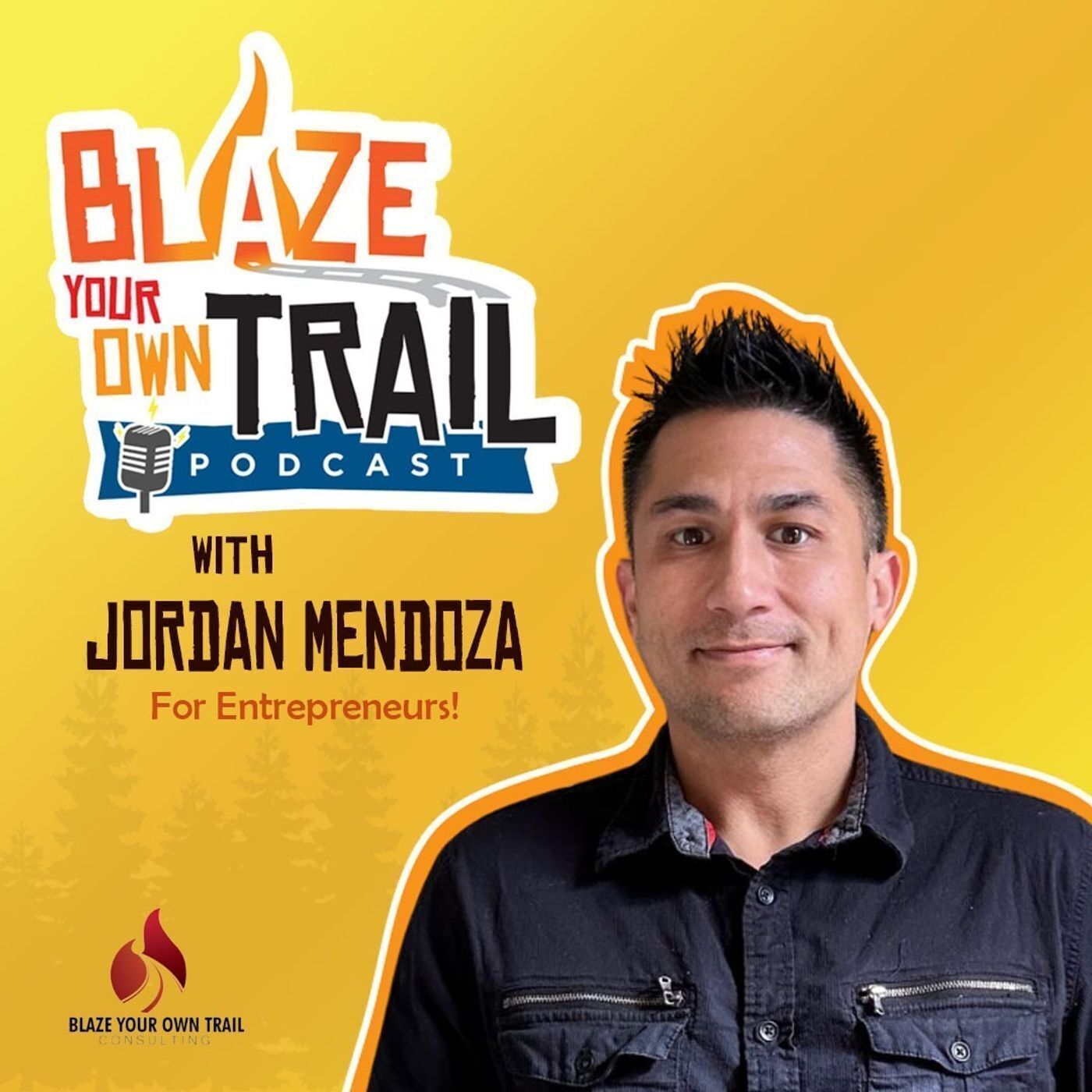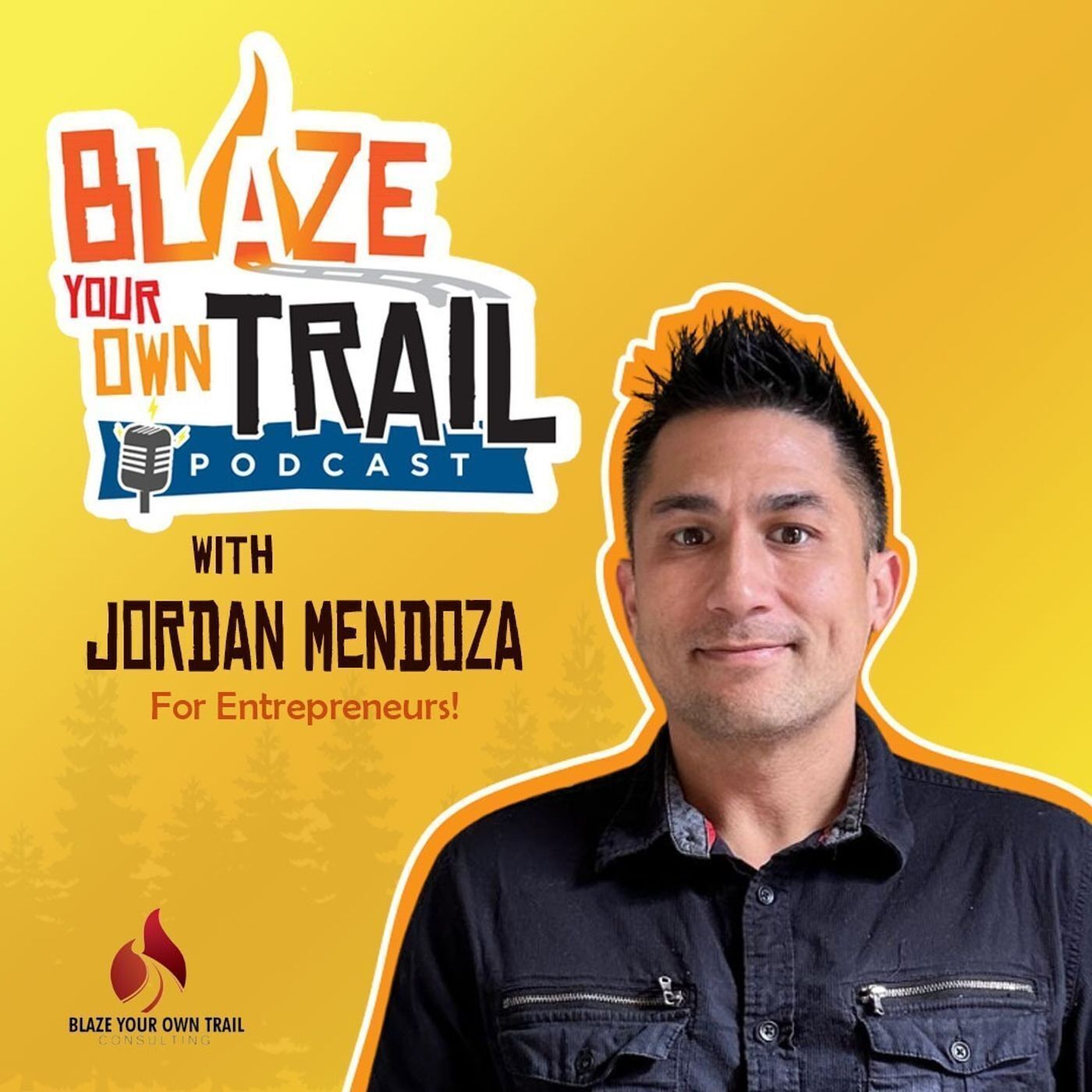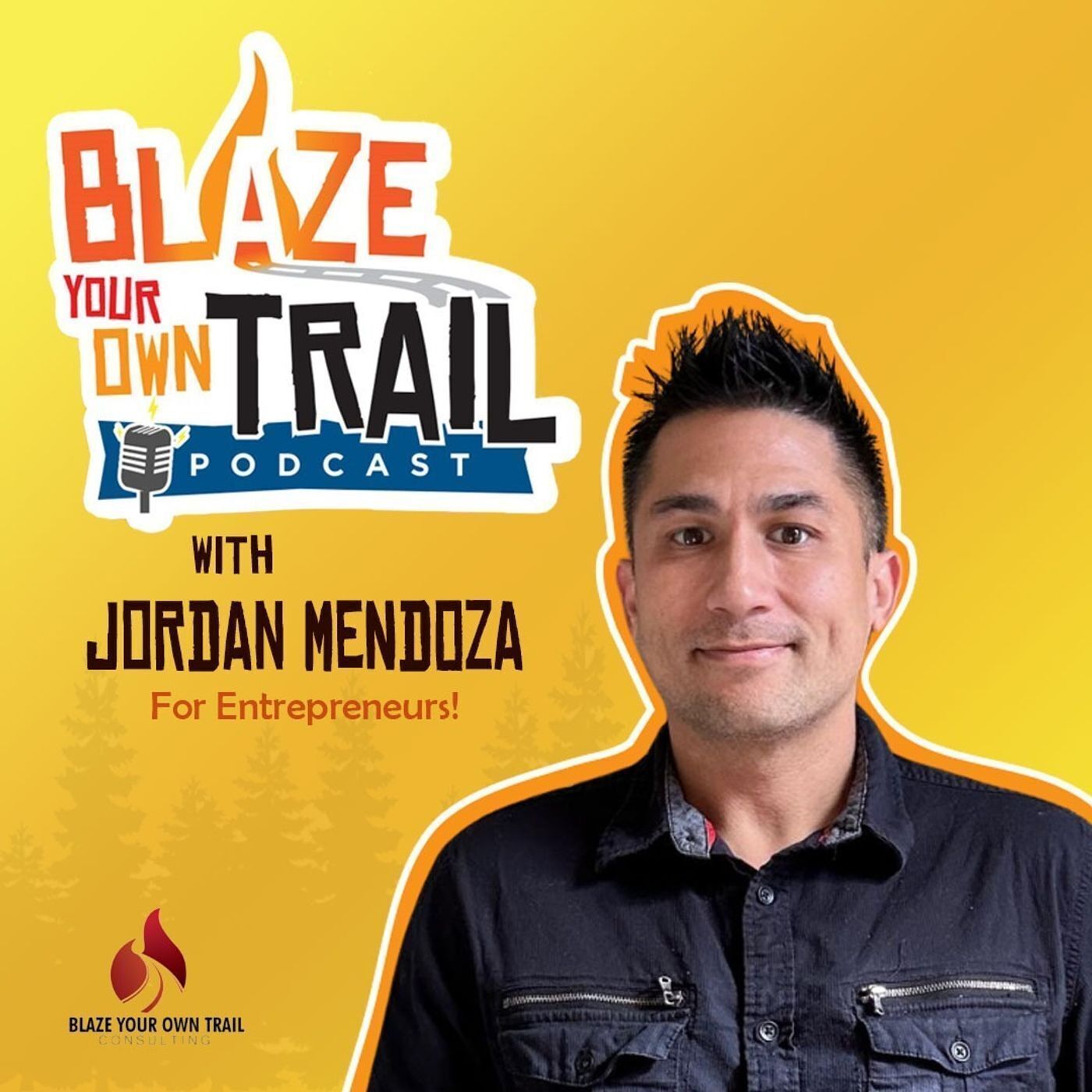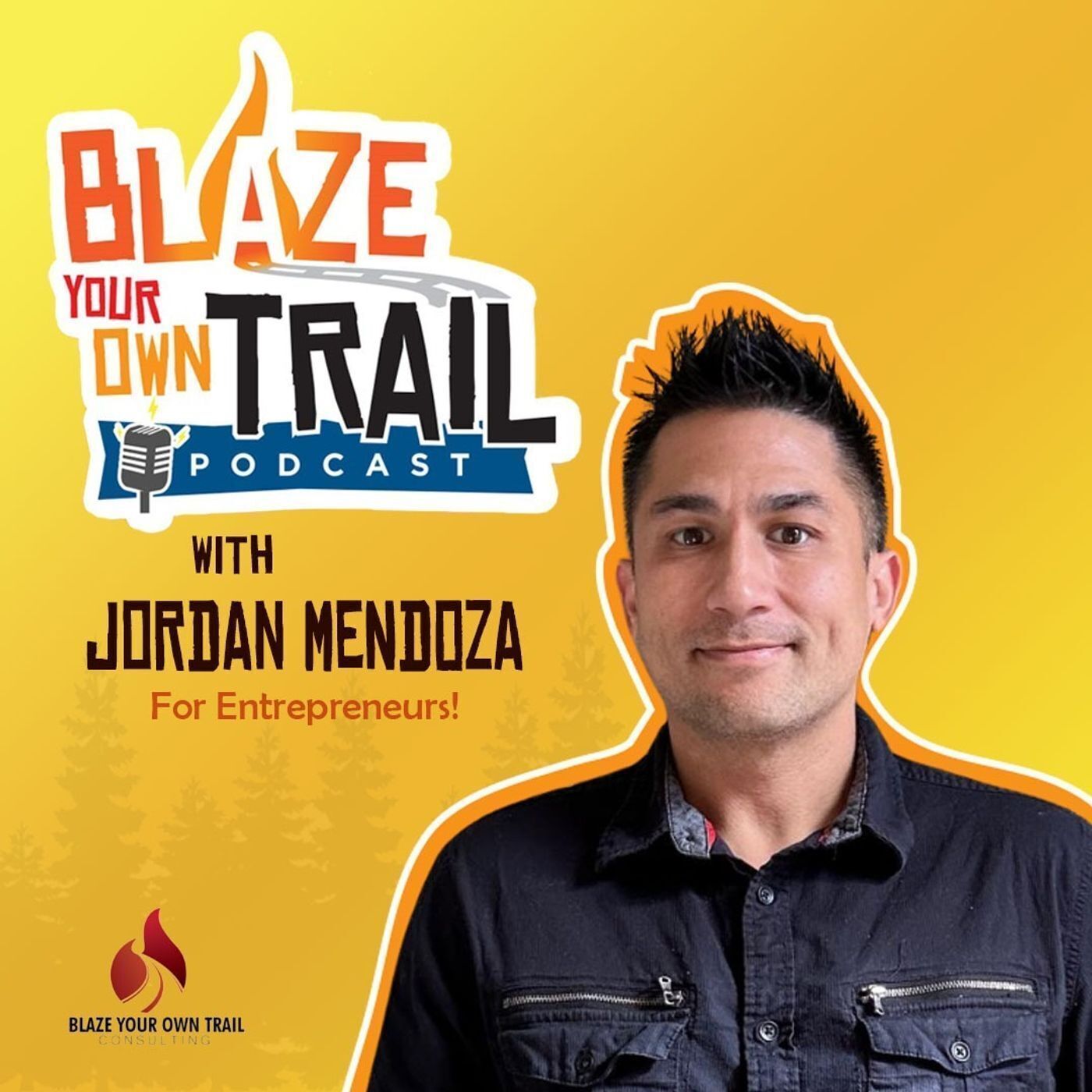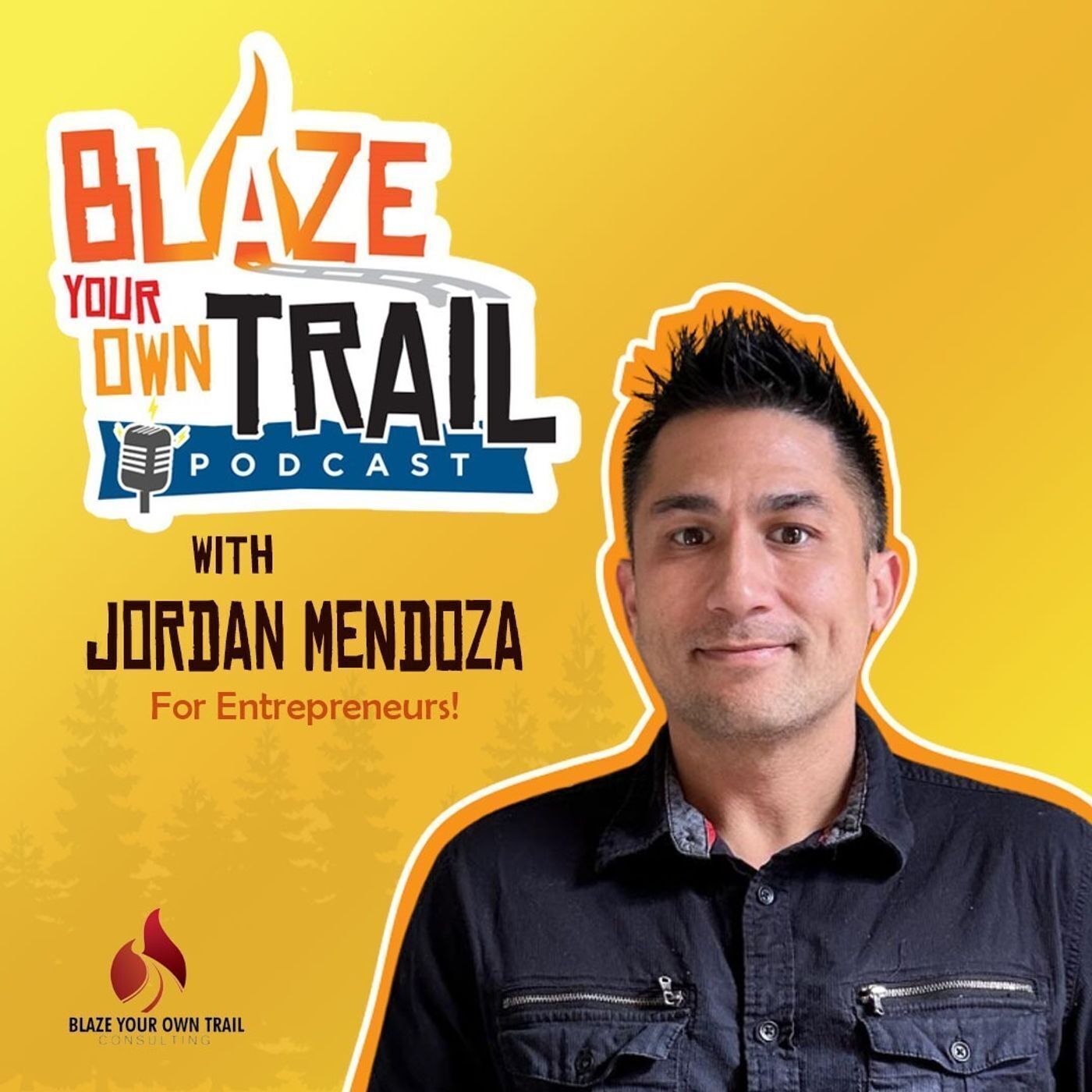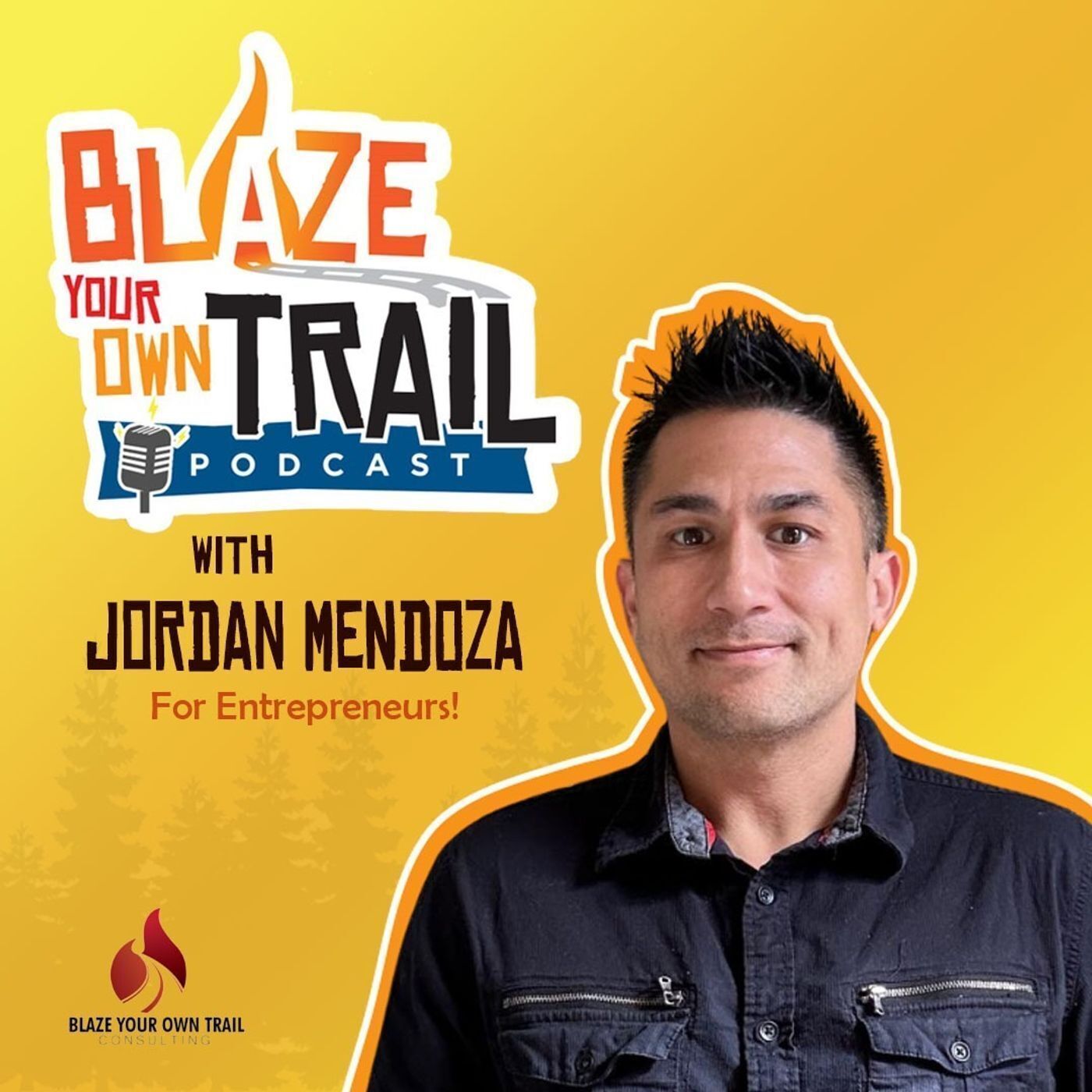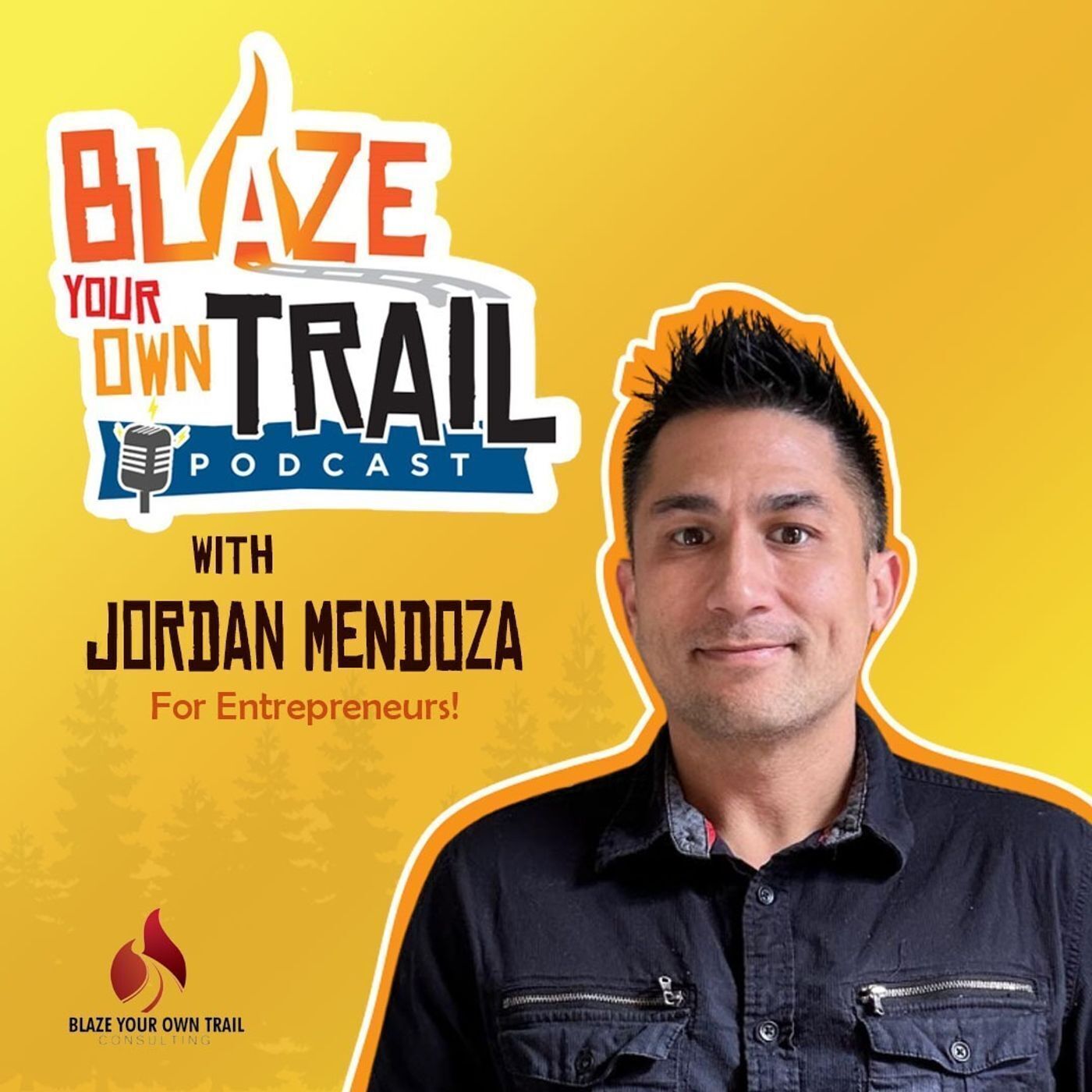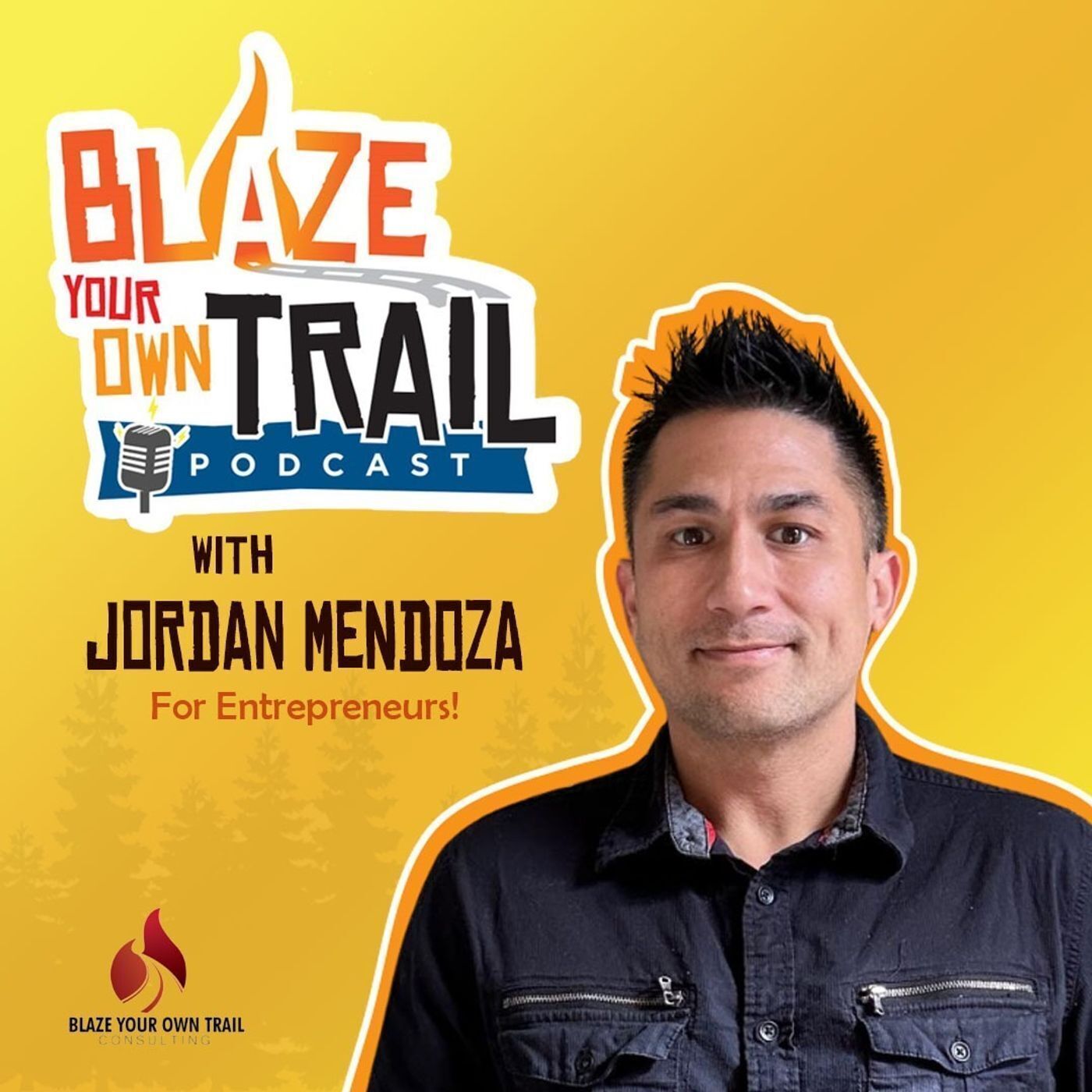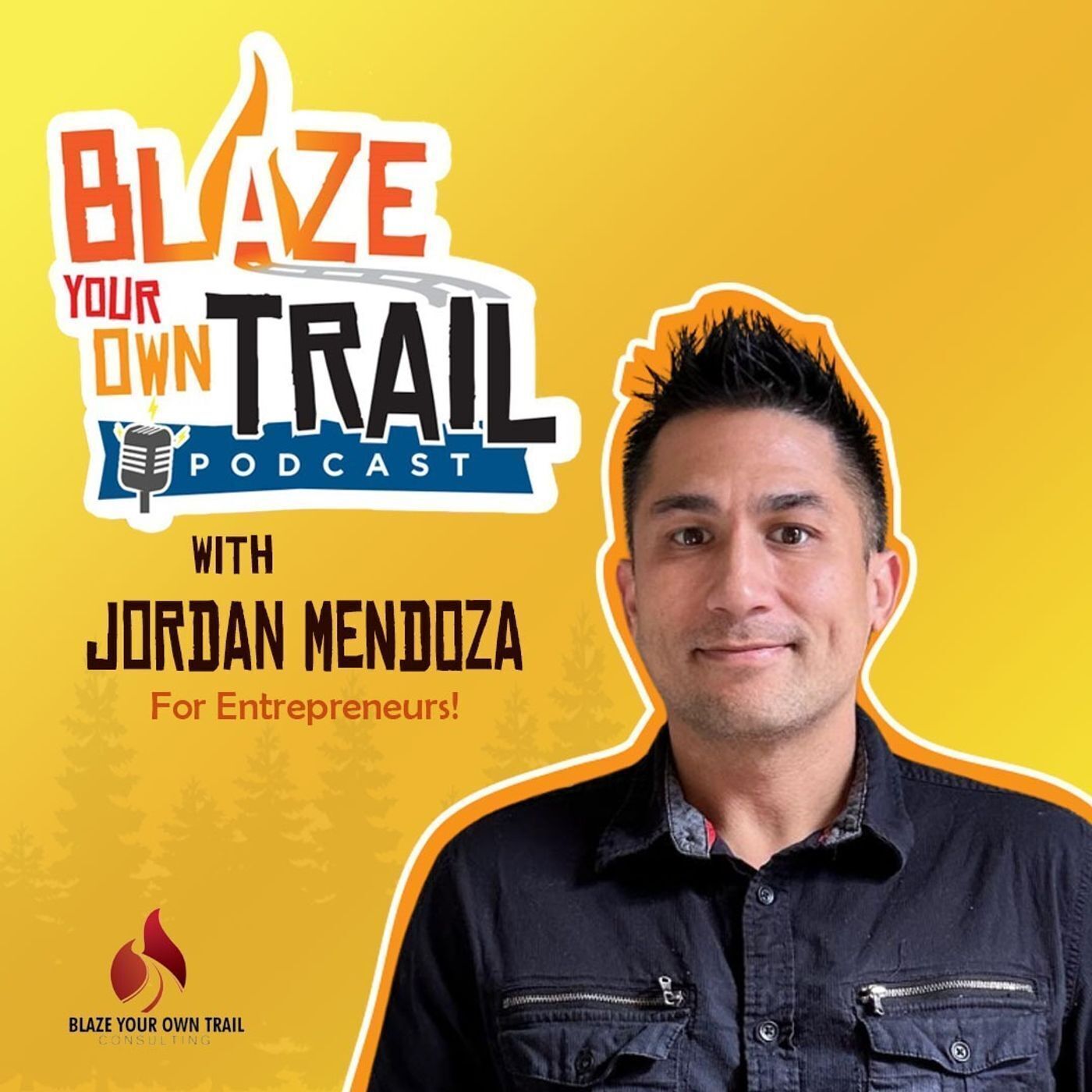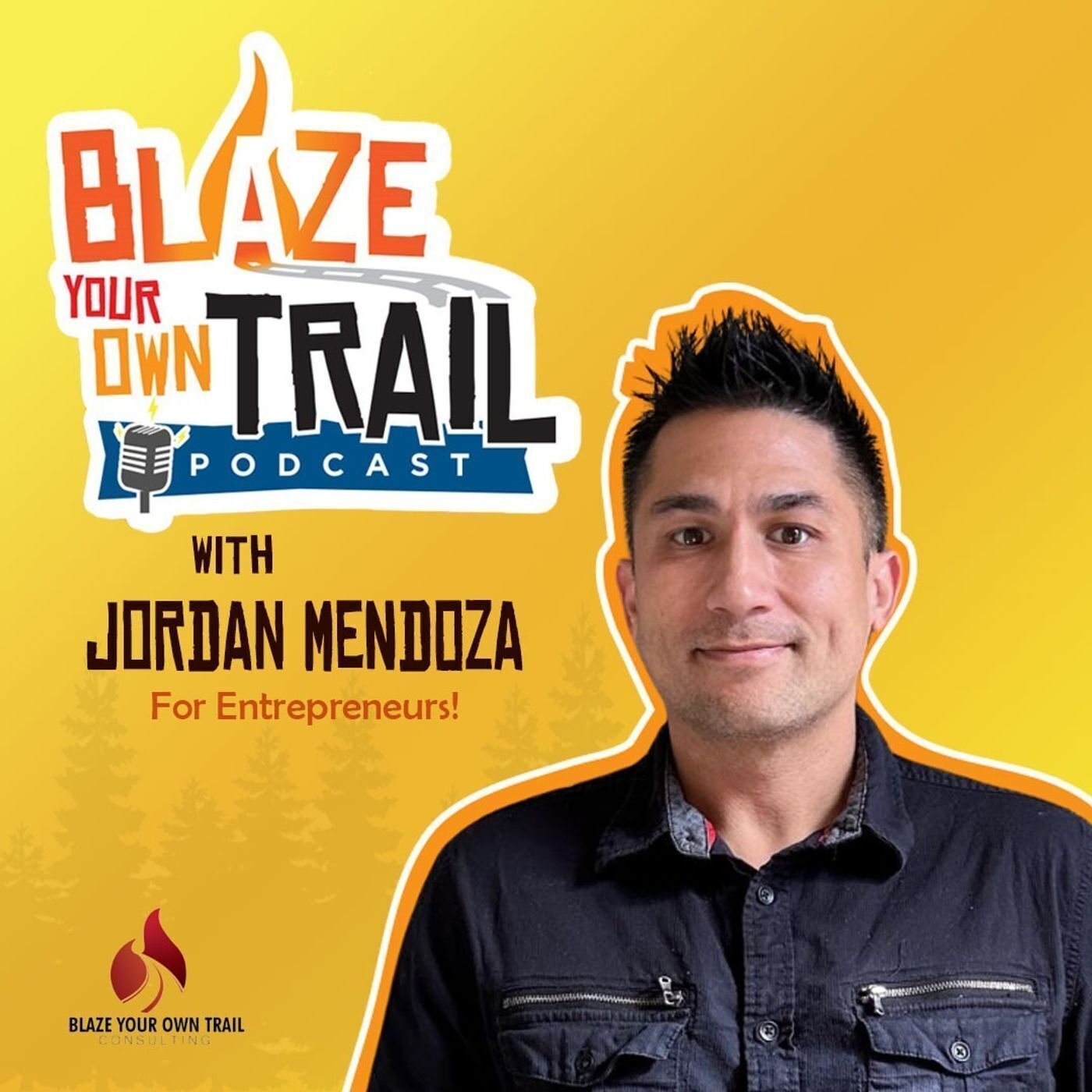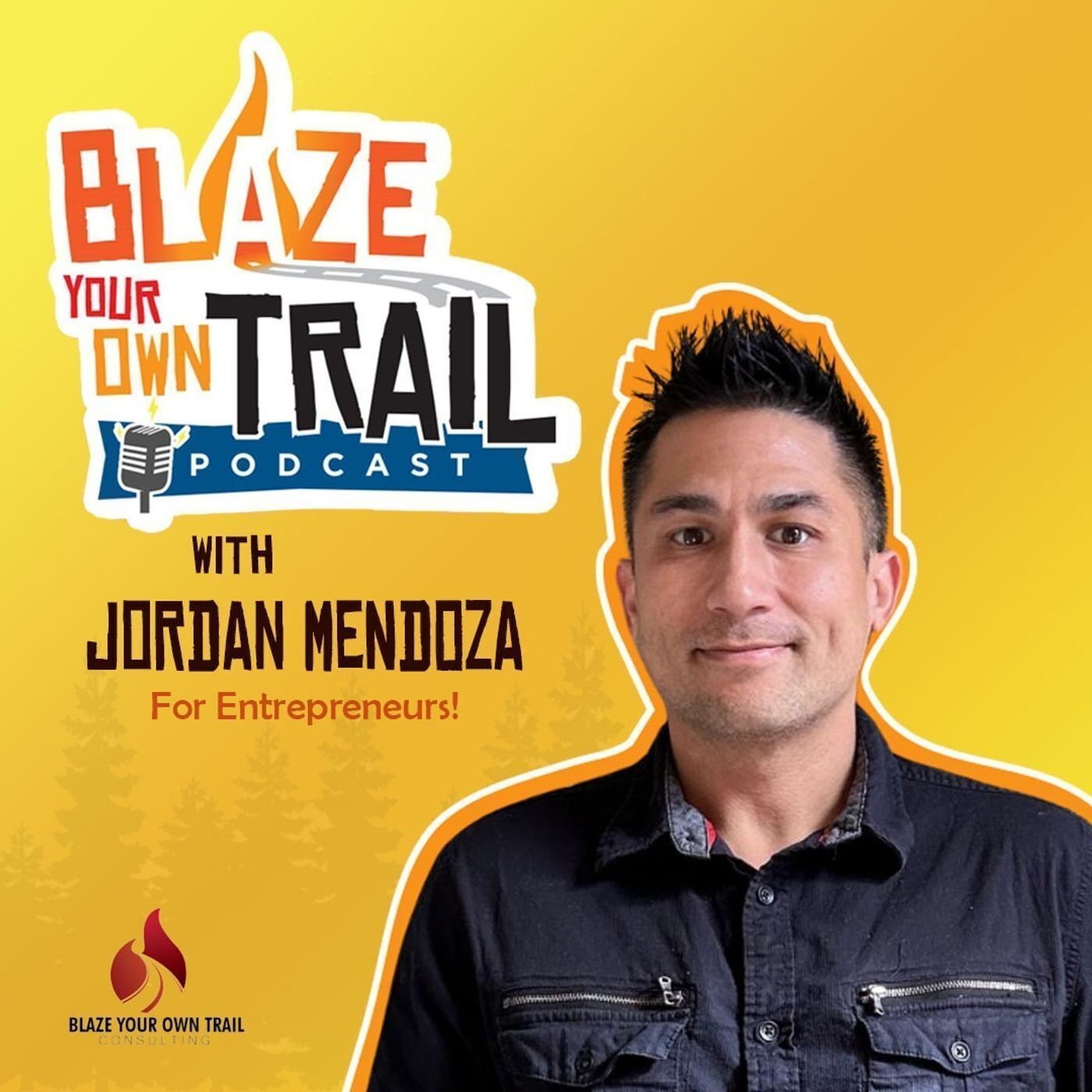

Summary
In this episode of the Blaze Your Own Trail podcast, host Jordan Mendoza interviews Junaid Ahmed, a technology enthusiast and home studio expert. Junaid shares his journey from growing up in Pakistan and Saudi Arabia to becoming a successful podcaster and entrepreneur in the U.S. He discusses his early experiences with technology, the importance of customer service, and how he transitioned into web design and videography. Junaid emphasizes the value of problem-solving and the lessons learned throughout his career, culminating in the establishment of Home Studio Mastery, where he helps others create high-quality content. He also provides practical tips for content creation using existing resources.
Takeaways
- Junaid's journey began in Pakistan and Saudi Arabia before moving to the U.S.
- He developed a passion for technology and photography at a young age.
- Customer experience is crucial in understanding client needs.
- Problem-solving skills are essential in technology and entrepreneurship.
- Freelancing allowed Junaid to build his own business.
- Home Studio Mastery was born from Junaid's expertise in video production.
- Quality content can be created with existing resources.
- Lighting and audio are more important than expensive equipment.
- Looking directly at the camera creates a connection with the audience.
- Every experience contributes to personal and professional growth.
Chapters
00:00 Introduction to Junaid Ahmed
01:43 Junaid's Early Life and Passion for Technology
09:02 Career Beginnings and Customer Experience
13:07 Transitioning to Freelance and Entrepreneurship
19:16 Building a Home Studio
24:25 Practical Tips for Content Creation
29:14 Connecting with Junaid and Final Thoughts
Connect with Junaid:
Website: https://homestudiomastery.com/
Listen to Junaid's Podcast: https://www.hacksandhobbies.com/
Linkedin: https://www.linkedin.com/in/superjunaid/
Facebook: https://www.facebook.com/superjunaid
Connect with Jordan:
Join Jordan's weekly Group Coaching Community Risk Free
Pre order a signed copy of Jordan's new book The Life-Changing Power of Adversity
The Blaze Your Own Trail Podcast is now exclusively sponsored by CityGate Studios
What does that mean for our listeners?
It means you'll be getter more consistent content with better visuals state of the art post production.
What does that mean for our future guests?
It means we now not only have virtual podcast options but have an option to record in studio and get Hollywood level content to help elevate your business faster!
Here is more information about our amazing sponsor below:
Welcome to the future of post-audio production. Our state-of-the-art facility, strategically located in the Atlanta-metro area, is setting a new standard in sound design, mixing, and immersive audio experiences.
Designed by the world-renowned Wes Lachot, our studio features patented acoustic architecture that delivers unparalleled sonic precision. With two Dolby Atmos-enabled control rooms and a spacious live room accommodating up to 20 instruments in a single session, we provide the ultimate environment for music and film professionals.
Situated in the heart of New Hollywood in Atlanta, we are just minutes from the country’s largest film production studios—offering seamless integration for filmmakers, content creators, and musicians. Our commitment to a drug- and alcohol-free environment fosters a professional, focused atmosphere, ensuring every project reaches its full potential.
Beyond cutting-edge technology and expert craftsmanship, we offer highly competitive pricing and a business-friendly climate, making us the premier choice for audio post-production in the region.
Experience a new era of sound. Welcome to Atlanta’s leading post-audio facility.
Want to get involved in CityGates misson?
Donate to the Go Fund me HERE
Are you a Podcast Host or Guest?
PodMatch helps the right podcast guests & hosts find each other faster and automates administrative work, so you can focus on what matters: recording interviews that serve listeners.
Hosted by Simplecast, an AdsWizz company. See pcm.adswizz.com for information about our collection and use of personal data for advertising.
The Blaze Your Own Trail Podcast is powered by:
Jordan Mendoza (00:03.96)
Hello everyone and welcome to the Blaze Your Own Trail podcast. My name is Jordan Mendoza. I'm your host and I've got a very special guest today. His name is Junaid Ahmed and I'm going to have him tell you a little bit about who he is and what he does today.
Junaid Ahmed (00:21.782)
Hey Jordan, super excited to be here on the podcast, Blaze Your Trails. What an amazing name for the podcast. mean, come on, kudos to you for that. And again, thank you so much for bringing me on to the show. I'm Junaid, like Lemonade, I'd like to say that just for people reading the name, like how do you say this name? Is it Junaid? I'm a father of four kids and I'm a huge enthusiast behind technology.
and photography and filmmaking and all things, parenthood and personal development. I don't know, there's so many different things, but I hail from.
Junaid Ahmed (01:02.284)
I know what to say. I hail from California, but I live in Virginia and I've been a podcaster for about seven years. I've been a huge technology enthusiast for over 30, photographer, filmmaker for about the same time. In fact, I bought my very first camera when I was 11 years old. And what I do is I help people, entrepreneurs, podcasters, professionals set up their home studio so that they can show up their best foot forward.
because the first impressions is what really matter. And when you show up with that confidence, people just want to listen and stay for the ride.
Jordan Mendoza (01:41.674)
Awesome. Appreciate that intro. And I'm excited to really dive into your story and your journey, you know, the early days of Junaid. So if you can share, I know you alluded to it a little bit that you grew up, you know, from California. So if you can share, you know, where were you born and raised and what kind of kid were you outside of, you know, photography and cameras? What other things did you get into? And we're going to really focus on the adolescent years. So elementary, middle to high school years.
Junaid Ahmed (02:06.52)
Yeah.
Junaid Ahmed (02:13.912)
All right, so I was actually born in Pakistan and then I grew up in Saudi Arabia. So my elementary school was really in Saudi Arabia and then middle school and high school as well. And I came to the US to California when I was about 19 years old. So growing up, I spent all my time outside, outside on a bike, playing with friends, sports, not that much into sports, but you know, I just...
wanted to be around my friends, so we played soccer, we played cricket, we played badminton, basketball, you name it. We played all sorts of sports outdoors all the time because when I was growing up, we didn't have that much technology. then growing up in Saudi Arabia, we only had two television channels. One was in English and the other one was in Arabic, and they both started at 5 p.m. Like there was no television showing in the mornings, right? Because most people are at work.
or at school, so I spent most of my time outside. And then my neighbor, had a Commodore 64, which I borrowed, started playing with it. And then around 92, my dad bought a PC, which was like mind blowing to me. And that's how my journey into technology got started.
Jordan Mendoza (03:33.1)
You see this first computer and obviously when your dad probably got this computer, I'm sure this was like the holy grail. Like this is like, hey, don't touch this thing. Don't mess with it. You're going to break it. Or maybe he said, hey, here's how you use it. Let me show you what this thing can do. So how quickly was it for you to actually pick up what was happening, what the actual machine did, how to actually use it.
Junaid Ahmed (03:45.29)
Yeah.
Junaid Ahmed (03:53.068)
Mm-hmm.
Jordan Mendoza (04:02.518)
and then what transpired after that. I'd love just to kind of find out.
Junaid Ahmed (04:05.378)
That's all there.
Junaid Ahmed (04:11.264)
Yeah, so my dad, he's been a systems analyst for many, years and you know, he worked at the computer. So when I saw him sitting in front of that computer, typing away on that keyboard without even looking at the keyboard, that just blew my mind. I was like, Whoa, that is pretty cool. I want to learn how to do that. So because I was already in my teens around the time my dad got the computer, we were, you know, allowed to use it. And, you know, I was also using computers at school in my computer science.
What do you say? Computer science was my major essentially when I was going to high school. And so, you know, I was using the computer and, we were using DOS, we were using WordPress, not WordPress. Was it WordPress? No, it was Word. I can't remember the word processing software that had back then. Anyway, so I'm using DOS and I'm learning all the things that I can.
just by trial and error, just trying different things, right? And then I remember when Windows 3.1 came out and it was on these 13 floppy disks and I would insert one after the other as it installed the operating system. And I just learned by trying different things on the computer. It was a lot of There was a lot of trial and error.
Jordan Mendoza (05:33.442)
Yeah. And so did that keep you inside versus outside at that point? Or did you still make sure you found time to stay active?
Junaid Ahmed (05:41.4)
still, yeah, I still go outside with my friends because they didn't have computers or, you we all find, found common things to do. And then we would do those, you know, riding our bicycles or listening to music or, you know, just hanging out outside. those, that's, those are some of the things that we did. But because that early introduction to computers, when I came to the U S.
I had heard something about America Online and these CDs would come up now. In our computer, we didn't have CDs, we didn't have a mouse, we didn't have any speakers. It was as plain as it can get. So when I came to the US, I was like, okay, I wanna get a computer. I wanna figure out what this America Online business is. And my desire and curiosity to learn about computers kept growing and growing. In fact, to the fact.
to the point that I was actually working at a computer store where I would assemble and build these computers.
Jordan Mendoza (06:42.04)
That's great. That's great. So went into that, I guess at that point you really knew that, hey, I always had a passion for photography. I've had a passion for like understanding these systems. And now you come to a new world essentially, right? Where you have access to different technology and now you're working at a place where you're learning all the things. So how long did you work there? And what would you say is...
Junaid Ahmed (06:53.409)
Mm-hmm.
Jordan Mendoza (07:10.316)
the most valuable things you learned there that help you in all the things that you help your clients with today.
Junaid Ahmed (07:19.446)
Man, this is such a powerful question because as I was working at this computer store, all I knew was how to build these machines and I would read articles and I would understand how these things go together. Of course, I also had mentors around me that was like, hey, no, this thing goes with this and this thing goes with this. But what I really learned at that job, I was there for about a year and a half, was talking to the customers, understanding what their needs were because people would...
this is a physical store that people would walk into. Like, hey, I'm looking for a CD-ROM, I'm looking for a video card. So they would walk in and they would say, hey, this is the problem that I'm facing, what should I be getting? Right, so I'm asking them and I'm learning from them what solutions, what problems they're facing, what kind of issue they're trying to solve. And then based on that feedback, I would then...
put together a plan and like, this is what I'm thinking. That's going to work for you best. it's, it's price conscious, you know, it's going to do all the things and it's going to last you a good number of years of it as well. So that first customer experience kind of, kind of thing was what really pulled me into, you know, you got to know what the problem is before you even suggest a product. People say, Android is better than Apple or Canon is better than Nikon. Like, well,
Yes and no. It all comes down to what problem are you trying to solve and which one is going to help you solve that fastest way.
Jordan Mendoza (08:51.022)
Yeah, that's great. So you got to do problem solving, you got to understand customer service, hopefully customer experience, know, like what experience should a customer have when we see them? You know, a lot of the things that I know are missing in today's society, I'm sure you learned about how to look people in the eyes, you know, how to smile, you know, how to read people, you know.
Junaid Ahmed (09:03.906)
Yes.
Yeah.
Junaid Ahmed (09:17.206)
Yes. The soft skills, right? The soft skills. Yeah.
Jordan Mendoza (09:17.398)
All those soft skills, you know, that now it's like, I wish rain could fall from the sky and people could just get hit with soft skills. You know, that'd be pretty cool because you walk into department stores or really any store and half the people working there are on their phone. not even like, they're definitely not giving you eye contact and they're not willing and open to help you. Not that people in society are willing and open to receive help.
Junaid Ahmed (09:28.48)
Yes, absolutely.
Junaid Ahmed (09:35.03)
Mm-hmm.
Junaid Ahmed (09:40.929)
Right they're not.
Jordan Mendoza (09:46.606)
But that's a whole other podcast. But so what happened a year and a half in? So you're a year and a half here. You're learning. You're really understanding like, wow, like this is really cool. I get to help people solve problems. I get to help them find the best potential solution. And so you're doing customer service, customer experience. What is it? Engineering, essentially taking things apart. You're doing sales, right? Because there is a transaction that's happening.
Junaid Ahmed (09:49.448)
Mm-hmm. Exactly.
Junaid Ahmed (10:00.716)
Mm-hmm.
Junaid Ahmed (10:05.901)
Yeah.
Junaid Ahmed (10:13.376)
Engineering yet. Mm-hmm. There's transaction happening, yeah.
Jordan Mendoza (10:16.557)
So what did you do a year and a half in? you go to another place? Did you say, hey, I want to maybe do something on my own? Like what was the next step on the path?
Junaid Ahmed (10:27.764)
Absolutely. So I'm just going to backtrack just a teeny bit to so when I came to the US, right, I assembled a computer, I put two computers together into one. I got introduced to, you know, some computer shops and, you know, I'm like, yeah, I this part, this part, put those things together. But when I got America Online and Air Wellness to Messenger, I was talking to people online. Like I'm working on my skills of typing, working on my skills of using the different software.
So that transitioned really well into now telling people what they should be buying based on the problems that they're solving. As I move along and got a better handle of technology and software, I was now asked by my uncle, like, hey, I'm starting this business, I need a flyer. So I started designing these flyers in Microsoft Word, which then took its own journey.
into designing software, designing websites. So the next job that I had after that was working for a company. They were a local website host company based out of California, Corona, called Island Breeze. So we, again, helped small businesses launch their websites. And we had the hosting platform. were using WordPress. We were using HTML pages back in the days.
I got better and better at it. I was then moving on to other positions where I can help on a higher level of experience, higher level of problem solving and solution creation.
Jordan Mendoza (12:05.964)
That's great. So you were getting essentially internal training. I've talked about this before on a podcast where I said our employers are our first investors. They invest time, energy, resources, training, coaching into us. And as long as we're willing to learn those things and actually go apply it, that usually ends up being the thing that we can do in an entrepreneurship world, right? Because we've
Junaid Ahmed (12:15.735)
Mm-hmm.
Junaid Ahmed (12:19.65)
Yes.
Junaid Ahmed (12:29.975)
Mm-hmm.
Junaid Ahmed (12:34.455)
Yeah.
Jordan Mendoza (12:34.562)
done it. We've had the testing. We essentially got paid training really to learn these skill sets. And then we said, all right, well, man, if I can do it here, then I can definitely do it out there in the real world or out on my own. And so how long did you end up staying for the web design company and what was that next transition like?
Junaid Ahmed (12:41.41)
Yes.
Junaid Ahmed (12:50.392)
100%.
Junaid Ahmed (12:57.576)
So the web design company was about probably about a year and a half as well. And the Taumans, know, again, this is more than 20 years ago. So I'm trying to piece together where it came from. And as I was working here, a friend of mine who I'd known through the computer shop, I knew that he was into video videography and he would film these wedding videos and, you know, edit them. And I even spent some time at his house, you know.
Figuring out and watching him behind the scenes as he's editing these videos in non-linear editors, right? So using Adobe Premiere, using, you know, we got recorded tape video coming back into it. So he connected me with another gentleman who ran a business where they provided video on demand for hotels. So I was like, hey, I can easily help you.
with the server side, with the managing of the content, like all of those things. And this is like 2001, where I started working for this company. And I was there for about four years. We would set up these systems, we'd contact the customers, we would contact the hotels, we would travel out to them, and we would make sure that all the systems are working and function. We have backend access to these servers so that we can update the content remotely.
It was really fascinating just to see all of these things come together. And I'm just on my path of getting better and better. How can I provide the solution better to the customers that I'm working with? So it's really fascinating how it all came together and the growth was just phenomenal.
Jordan Mendoza (14:41.314)
Yeah, I mean, coming from, hey, like now there's the internet, right? Like I can get online to now I'm learning how to build websites, you know, the back end process. Now I'm actually going and traveling to go on site to actually build these for massive organizations. Yeah. So there's definitely an evolution there. And what, did you end up doing next? I know that obviously wasn't the last stop on your, on your journey to trailblazing. So.
Junaid Ahmed (14:50.69)
Mm-hmm.
Junaid Ahmed (15:01.644)
Yeah.
Junaid Ahmed (15:10.613)
Of course.
Jordan Mendoza (15:10.89)
After you got this now newfound knowledge, you're adding more to your toolbox essentially of things that you can help people with in the future. Where did you take your talents next?
Junaid Ahmed (15:13.367)
Yeah.
Junaid Ahmed (15:19.126)
Mm-hmm.
Junaid Ahmed (15:25.378)
So as I was working for this company, was also learning, I was also continuing to build websites for other people. And I had built relationships through these companies with other individuals and company owners. And there was this one individual that I was talking to back and forth, his name was Cliff Hall. He's probably around in Arizona. But anyways, I was...
And as that company that I was working for was downsizing because the technology was moving faster than we could keep up, I was like, you know, I can't work in this environment anymore. I've grown as much as I could. I'm no longer going to be here. So I started doing more freelance work. And as I'm going for different job interviews to work for companies, I am on the phone and I call up Cliff Hall. I'm like, Hey, Cliff.
I'm going to be in Irvine later today. Do you mind if I stop by so we can talk about the website that we're building for you?" And he's like, absolutely, come on by. I actually wanted to invite you. Like, sweet. So I go there and there's this massive, they have an entire floor on the first floor in Irvine, this building. And he's like, my God, this is so cool. I can't wait to show you what we've been working on. And they had...
you know, done some research and development. went to Korea. They brought these really high-end video on demand boxes. Again, it's nothing like streaming services that we have now, but it was still, you you still need a dummy box in the room that's then contacting the server room to, you know, send the video over. I'm like, all right, let me, so he shows me and I was like, this is so cool. So, you know, I got to meet some more people and then,
And then I was talking to the CEO of the company, his name is Herbert. And I was like, hey, I wonder if I can spend, since I'm working on your website, do you mind if I come here in your office and work from here on your website? And then there was like row of empty cubicles, right? Nobody's sitting there, nobody working. He's like, I don't know if you have space. I mean, we're pretty packed here, right? He's just joking.
Junaid Ahmed (17:49.876)
And then the next day I started working there. You know, it was just my intrigue and my willingness to provide the service for them and, you know, being passionate about technology as well. So they saw me and they signed me up as the founder. The founder, I can't remember the exact name, but like the founder of Contacts is what they signed me up. So I was there for about two and a half years. And as I was there,
the company kept evolving, they brought in a new CEO and that CEO, so it was really funny story because what happened is that CEO ended up firing me for keeping in contact with a prior CEO. How did he know that? Well, I had printed the directions to the company on, we used MapQuest back then.
we didn't have GPS and I had printed directions on the printer and the current CEO saw it and he's like, are you gonna go see Tom? I'm like, yeah. Like, all right, cool. And the next day he basically fires me. He's like, sorry, we can't have you here because you're still in contact with prior CEOs. Like, that's interesting.
Jordan Mendoza (19:09.326)
That is very interesting. Yeah. You see that a lot though in companies where you stay in contact or a lot of times you leave and then yeah.
Junaid Ahmed (19:19.734)
Yeah. They feel threatened, right? They feel some kind of threatened. why would you think that? So anyways.
Jordan Mendoza (19:23.692)
Yeah. So you get get can there, right? Do a bunch of good work and then the new guy comes in. You know, that that happens when there's a change in ship. Sometimes, you know, you get let go. So now you're kind of back to the drawing board here. Does this make you think about your next plan very carefully? Like, what do you decide to jump into next?
Junaid Ahmed (19:35.116)
Yeah. Yeah.
Junaid Ahmed (19:45.856)
It does. 100%. So the funny thing, like you remember I said, when the Herbert had me sign the founders contract, which means that if somebody fires you, you get 60 days of severance. So that contract held up, you know, it's like, Hey, you got to pay me for 60 days. And in the meantime, I was working for a company that's downstairs.
So there's two floors, the top floor was the company that I was working for, the bottom floor was another company and they helped people launch their LLCs, launched their, and you know, so there was basically an education company and they would educate people how to set up their businesses and they had a huge aspect of teaching people and doing webinars and whatnot. So I started working for that company for two months before moving on to other.
experiences of helping, you know, continuing to help the software development and software design aspect of customers and user experience.
Jordan Mendoza (20:51.874)
Okay, that's great. So at what point do you look around and say, you know what, I've been doing a lot of work for other people. I've been building a lot of people's dreams and businesses and having them achieve their goals. Maybe it's time that I blaze my own trail and start doing this for yourself. And I know you've done, did some freelancing up until this point, but when does that, when does that timeline click for you?
Junaid Ahmed (21:03.17)
Mm-hmm.
Junaid Ahmed (21:14.903)
Mm-hmm.
What does that happen? So we're still about 10 years away from when I actually lost more reps, many more reps because, related, right? Yeah, yeah. So I worked for another company that was also again based out of California, worked here for about three years, they were the number one ads, Google ads.
Jordan Mendoza (21:21.902)
So lots more reps. Were any of the reps, yeah, any of the reps all still related to the same industry? Yep.
Junaid Ahmed (21:47.81)
providers. they built campaigns, they built systems, and this is around the iPhone version 2 came out and Apple was like, you can now design your own apps. And so I took our main app that we provided a campaign builder for companies and I built a mobile version of it. Not usable, but it was just a design and layout. And so they were really impressed. Again,
Crazy story happened in this company as well. They brought in a new CEO. The company started doing really well. They went public. The stock was chirodic, rocketing, and then all of a sudden everything just crashed. And then it started doing massive layouts. And then I got laid off and I was like, hey, that's cool. We'll go from here. And they're like, hey.
Jordan Mendoza (22:27.715)
Wow.
Junaid Ahmed (22:40.514)
you we got you the Mac. If you want to take the Mac Pro, you know, I'd be happy, you'd be happy to, you know, gift that to you as a parting gift. I'm like, well, I would actually look like a MacBook Pro instead. And then you, another person had a MacBook Pro. So the next day, like come on tomorrow and we'll give you the MacBook Pro. I'm like, all right, that works. So from then on, I was just doing freelance work with my partners and friends in Santa Ana.
And then my wife's like, okay, that's enough freelance, so you need to go find a job again. And then I started looking for work again. Went to work for Dish Network in Colorado. I had interviewed for like 15 minutes and this guy knew that he wanted me to work, come work at Dish Network. I get a call next day and like, hey, can you come on Monday? And this was Thursday. I'm like, yes, I can come on Monday. So I go there for two weeks without telling anybody what I'm doing because
You know, there is a thing about an evil eye, right? If you tell somebody you're doing something good, you you might get, what's that word? Jinxed, right? So was like, okay, let me go see if this is the real deal. I go there, you know, work for two weeks, come back, bring my family over. was my wife and my almost two-year-old son. So we moved to Colorado in 2011.
and I worked at Dish Network for about four years, had so much fun, we created a lot of mobile apps. Again, I'm just putting in the reps to understand, what does it take to take feedback and then build these systems out. Fast forward, 2014, we ended up moving to Virginia. My wife is from here, so she was like, hey, I wanna move back. Let's do that. So I moved back here, worked for DOJ, didn't work for FINRA.
and then worked for the World Bank. And around the time I was working for World Bank, was December 2019, right? And we're hearing about COVID breakout and all these things that are happening. I'm like, that's pretty cool. It's in China. And of course, in March, we all started working from home. But luckily for me, prior colleague,
Junaid Ahmed (25:04.024)
that I had worked for at DOJ contacted me. He's like, hey, Junaid, are you open to working full-time remotely at a company? I'm like, yes, please, that's the dream. Now, just to give you a little backstory, this is 2019, towards the end of it, and I had already been podcasting for two years. So I had already been creating content. I had already been using the cameras, building videos and whatnot.
not really as a full-time profession, but as a hobby. So I'd been doing that for about 10 years. So when I got the opportunity to come work from home, was February of 2020, I'm working from home and as I am spending time in front of the camera, spending time recording these videos, I started putting my knowledge of video production into play. And as I'm doing this, people started noticing.
They're like, wow, why is your video so clean? And it takes me about a year and a half before I realized that there's a service aspect to it. Of course, it took me a while to get my place, you know, really dialed in because of COVID restrictions and COVID slowing down the shipment of products. But when that set was ready and go, people started asking, what's going on? What are you doing, Junaid? And that's when I formed
home studio mastery, started helping as a consultant and building courses and you know, it's been four years and it's been going pretty strong.
Jordan Mendoza (26:41.122)
Love it, love it. And so my guess is that you're leveraging all the things you learned in the multiple decades in tech, right? In computers, in videos, in web development, in ads, and using all of that knowledge to help your clients. And what's great for those of you listening, not only can he help you build a home studio that is awesome, but with the other skill set, he may look at something that you have and say,
Junaid Ahmed (26:53.516)
Mm-hmm.
Jordan Mendoza (27:10.422)
I'd probably recommend that you do this because I've helped thousands of people with these types of things at scale from the startup to big organizations. So that's one thing that I always encourage like my coaching clients, don't ever discount a stop on the trail. Don't ever discount it because there's value. just haven't identified where it is yet, or we just have not extracted, haven't taken a introspective look back at the past.
Junaid Ahmed (27:15.126)
Mm-hmm.
Junaid Ahmed (27:29.299)
Mm-hmm.
Junaid Ahmed (27:35.799)
Yeah.
Jordan Mendoza (27:39.832)
to reflect and say, wow, that's what got me here. It was the reps, was the grinding, was the, yep, this one didn't work, but let me just go to the next one and try to learn how to solve some more problems. And as a business owner, folks, you're gonna have problems early and often. And your job is to figure out how to solve them for yourself, for your clients, doesn't matter.
Junaid Ahmed (27:46.018)
Mm-hmm.
Junaid Ahmed (27:53.88)
Yeah.
Jordan Mendoza (28:05.324)
whether you're in home studios, whether you're in real estate, whether you're in PR, you're a coach, you're an author, it doesn't matter, you're gonna have problems, you're gonna face adversity, and we gotta figure out how do we overcome it, how do we get to the other side? And so, for the people that see the content that comes as a result of this episode, you will see Junaid set up, and so I wanna set him up by giving him an opportunity to...
Junaid Ahmed (28:17.815)
Yeah.
Jordan Mendoza (28:33.504)
share maybe two or three things that the average person, any listener that maybe doesn't have $1,000 where they can just go buy a new computer, they can go buy a new camera. But I'm pretty confident that Junaid, in his plethora of experience, can give us a few hacks or tips to help us with what we have. So what can people do with what they have today when they hear this episode?
Junaid Ahmed (28:41.344)
Mm-hmm.
Junaid Ahmed (28:55.096)
you
Junaid Ahmed (29:00.472)
100%.
Jordan Mendoza (29:02.584)
to make their visual experience better for their audience.
Junaid Ahmed (29:09.634)
Thank you for that question Jordan. I love answering that question because I've been on the other side of that question. I asked myself, what do I need? Why do I need all of these things? What can I do with the stuff that I already have to actually create some good content? I've bought multiple gimbals over the years that I didn't use because I thought I was going to use them. Like, it's going to be so cool. It's going to give me the cinematic.
But what really matters is what...
how you use the gear that you already have. Because if you can get really good at using the gear that you have, then it makes sense for you to go invest into the next level, into the next stage. So I start with, hey, you already have $8,000 camera in your pocket, right? It's the one that you use to browse the internet. you know, scroll through the different social media apps, you know, scroll through web pages.
It is also a powerful creation device. Did you know we are right now in 2025, but when iPhone came out in, iPhone 15 Pro came out in 2023, Apple stopped spending money on cameras. They're like, hey, we already have iPhone 15 Pro. They used iPhone 15 Pro on 10, 20, $30,000 rigs to shoot all of their gear. They're mounting that iPhone on a
drone to capture footage. They've got this iPhone mounted on a 40 foot arm that can go back and forth.
Junaid Ahmed (30:54.84)
to capture content. Where do they spend the money? On lighting, on audio. But they already have a really powerful camera. So, if you already have these cameras, smartphone devices, it doesn't have to be iPhone, right? It could be any smartphone. They have really good cameras built into it. I think Samsung can do 8K video recording on those phones, which is massive. What you want to focus on is three important things. Number one.
Make sure that when you're speaking, you're speaking clearly and elegantly so that people can actually hear what you're saying. Number two, focus on where the lights are. Where the light source is, right? It could be a window, it could be something in your background. So make sure you don't have any lights shining back into that camera because...
We don't like looking at the sun. Why would the camera want to look at the sun? So make sure you're focusing on those two things. And the number three thing is to always make sure to look at the camera lens when you're talking. Because that's how you're creating that connection with the person on the other side.
Jordan Mendoza (32:07.596)
Love it, my friend. Thank you so much for those tips. know, one tool that I got, and I'd love your feedback on if this is something that you use or you've had folks use. they have the ability where you can get a separate monitor. So I have this, it's a monitor and you can put it on the back of your phone, right? So now I can basically see exactly what my back camera sees.
Junaid Ahmed (32:24.589)
Yes.
Jordan Mendoza (32:33.671)
And because it is a little awkward. know you probably coach a lot of people on this, but holding your phone from the back camera and trying to look and make that show up clearly, it is pretty awkward. So, but grab one of these devices. They're pretty cool. They connect to your phone and it enables you to see what your back camera sees. And so you can not only have clear content, but you can have more confidence that you are looking directly in the camera because that piece of advice is...
Junaid Ahmed (32:35.948)
Mm-hmm.
Junaid Ahmed (32:41.432)
Mm-hmm.
Junaid Ahmed (32:47.628)
Yeah, it is.
Junaid Ahmed (32:53.826)
Yes.
Junaid Ahmed (32:59.764)
Mm-hmm. Yes.
Jordan Mendoza (33:03.466)
so powerful, especially when you're recording content that educates people. When you're recording something motivational, you want to be looking so that people feel like you're talking directly to them. So love that.
Junaid Ahmed (33:11.202)
Mm-hmm.
Junaid Ahmed (33:16.792)
100 % that's an amazing tool. It's basically mirroring your screen or you know showing what the camera sees it's perfect. And if you can't afford that even though it's know 60-70 it's pretty cheap. If you can't afford that use your camera as a webcam for your computer. Right? So that way, yeah. Yeah.
Jordan Mendoza (33:35.778)
Yeah, yeah, we talked about that recently on a separate call. Yeah, I still haven't set that up yet, but I think I'm going to go the camera route. You've mentioned a couple of cameras that, mirrorless cameras that can do an even way better job. But I'm going to need a guy to help set that up. And folks, if you've been listening to this episode, you also might need a guy. And Janay, transitioning into where can people
Junaid Ahmed (33:52.116)
Mm-hmm. Yeah.
Ha ha.
Jordan Mendoza (34:03.662)
get ahold of you. We're going to have people listen to this. They're going to look at your story and journey and see a trailblazing journey because it was all about the reps. mean, you didn't even come to this country until you were 19 years old, right? And then found out about AOL, right? The only thing I used AOL for and the first time I think I got it was I was 15. And I remember putting M15, like male 15, because I was like trying to message people that were my age.
Junaid Ahmed (34:18.327)
Yeah.
Mm-hmm.
Jordan Mendoza (34:33.634)
That's right. So it was like we had no clue what we were doing and you'd just wait to see if somebody replied back. It was like the craziest thing of mind blowing back then. So where can people get a hold of you if they want to build their own home studio? And I know you help people with everything as small as a closet, right? You can make a closet look sexy and look like a full cinema studio. And I know you help with people with massive projects.
Junaid Ahmed (34:34.314)
ASL, right? ASL.
Junaid Ahmed (34:43.714)
Yeah.
It's absolutely amazing.
Junaid Ahmed (34:58.168)
Yeah.
Jordan Mendoza (35:03.188)
up to the 100,000 square foot mark if they needed that. So where can people go to find you?
Junaid Ahmed (35:12.066)
So to find me and learn more about the home studio biz, the program, head on over to homestudioMastery.com. If you wanna connect with me on all the social medias, I am at SuperGenaid or, that's where you can find me. And if you're interested in learning more about the different states that you might be in, I have a really cool tool that, cool book.
There's a really cool book that I wrote called Seven Stages of Home Studio Evolution so you can help figure out, what stage am I on? What do I need to work on? Because you can go step into a thousand dollar or a hundred thousand dollar studio. But if you don't know how to talk to the camera, if you don't know how to speak to the audience, if you don't know how to tell your message, if you don't know any of those things, none of that stuff matters. So make sure that you're working on your story.
You're working on your reps. You're working on yourself because that's something nobody else can install on you. Unless we're in the Matrix where Neo just looks over to like, hey, I want to learn Kung Fu. And he just loads the disc. I'm like, I know Kung Fu. And then Morpheus comes over, show me. It would be so nice.
Jordan Mendoza (36:29.164)
doesn't work like that. It would be nice, folks, if it worked like that. Yeah, so take Junaid's advice. It is all about the reps. And if you're one of my clients listening to this, you are tired of me telling you that because at the end of the day, that's where the rubber meets the road. We can complain, we can whine, or we can go and put in the reps and we can learn. Because every stop on Junaid's trail added value. Every single
thing that he learned is helping him execute the way that he executes today because of the trials, the lessons, whether it's being fired, whether it's, you know, having to start a whole new vertical, just being open and willing to change, being open and willing to pivot when you need to. It's so helpful on the trail. it's again, change is inevitable folks. It's going to come early and often adversity is going to happen. We just have to be willing to be flexible, to be open.
and to learn along the way. So, Junaid, thank you so much for coming on the podcast. I hope you have an amazing rest of your day.
Junaid Ahmed (37:37.026)
Thanks Jordan, this was fun.

Author / Home Studio Architect
Junaid is the founder of Humblezone and creator of Home Studio Mastery, designed to teach you how to build your home studio. He has two decades of video production experience and designing websites & apps focused on a systematic process and seamless user experience. He provides podcasters, speakers, and content creators with a comprehensive plan for their studio equipment, lighting, and layout. He also enables video creators to create effortless content in a comfortable and impressive home studio setting. He’s the author of Mastering iPhone Video Production, Seven Stages of Home Studio Evolution, and the Host of the Hacks & Hobbies podcast. He also speaks frequently at national events such as Podfest and multiple virtual summits.

